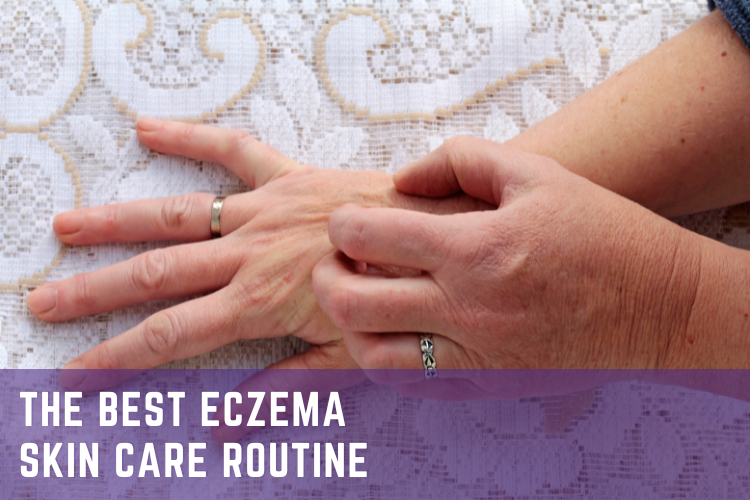The Best Eczema Skin Care Routine
Suffering from eczema can be incredibly debilitating, but there are ways to combat it. Learn more in this eczema skin care guide.

Skin is your body's largest organ, so it can be frustrating when it isn't healthy. One of those conditions, eczema, can affect more than 15 million Americans each year.
Eczema causes your skin to get itchy, red, and dry. It can be a debilitating condition if it is not taken care of. The right eczema skin care can keep your symptoms under control so you can keep on living the life you want.
This eczema skin care guide looks at what you can do to help your skin and protect it from future flare-ups.
Eczema Characteristics
People with eczema can have dry, scaly patches, blisters, and rashes on their skin.
Most people find eczema on their hands, elbows, neck, ankles, knees, and feet. This condition can occur anywhere from infancy to adulthood.
Eczema isn't contagious and won't spread from person to person. Although there is no cure, there are several things you can do to help your condition.
What Causes Eczema
This skin condition can come about from both environmental and genetic factors. You can categorize the main reasons for eczema into four groups.
Immune Response
Eczema can happen if your immune system reacts to allergens or skin irritants. If your skin overreacts to something like harsh soap or latex, eczema can occur.
Genetic
Genetics significantly impacts how likely you are to experience this skin condition. If someone in your family has eczema, you're more likely to have it too. You're also more likely to get eczema if you have a family history of hay fever, allergies, or asthma.
Environment
Finally, the environment that you live in can cause eczema. Fabrics, tobacco smoke, and harsh soap can all trigger eczema. High humidity and heat can make you sweat and cause your skin to get itchy and dry.
Stress
High-stress levels can trigger eczema or make it worse. There are signs to keep an eye on that can indicate higher stress levels. The following are symptoms that people under high-stress exhibit:
- depression
- having a hard time relaxing
- low self-esteem
- constant anxiety
- mood swings
- sleeping too much or too little
- tension in your muscles
- dizziness and nausea
Types of Eczema
Eczema isn't a one-size-fits-all condition. There are seven different types of eczema you can suffer from.
Atopic Dermatitis
This is the most common form of eczema. This form starts when you are a baby and gets milder as you age.
Contact Dermatitis
Eczema triggered by an allergic reaction is called contact dermatitis. Many people with this form of eczema get it from touching things like bleach, latex, or poison ivy.
Neurodermatitis
The main characteristic of this form of eczema is thick, scaly patches. These patches can be very uncomfortable and itchy when you sleep. If you scratch at them, they can get infected and bleed.
Dyshidrotic Eczema
You'll get little blisters on your feet and hands if you suffer from dyshidrotic eczema. More women have this condition than men.
Nummular Eczema
This skin condition causes coin-shaped spots of scaly patches on your skin. The pattern is distinct, and it can be very itchy.
Seborrheic Dermatitis
This form of eczema targets your scalp. You'll get scaly red patches and dandruff that is hard to eliminate. Other oily areas like your eyebrows and nose are prone to this form of eczema too.
Stasis Dermatitis
Your lower legs are the body part most impacted by this type of eczema. If you have this eczema, your legs may swell and feel achy. The skin on your legs will get dry and develop sores.
How Eczema Is Diagnosed
A doctor or dermatologist will be the one to diagnose this skin condition. Most doctors can make a diagnosis based on an observation of your skin.
If your doctor still needs confirmation, there are a few tests they can run. An allergy test, blood test, or skin biopsy are all ways to get an eczema diagnosis.
How to Take Care of Eczema Skin
Because eczema causes vary, treating this skin condition can be tricky. If you have a genetic form of eczema, you can take a few steps to help minimize your symptoms.
Your dry skin will crave moisture. Use a moisturizing cream each morning and evening to keep your skin hydrated. This layer of cream will soothe skin and keep your itching under control.
Make sure you know what triggers your eczema outbreaks. If you can, avoid these to keep your skin calm and reduce flare-ups.
Don't use scalding hot water when you bathe. The hotter the water, the drier your skin will get.
Keep your home and body at temperatures that don't get too hot. Wear cotton pajamas to bed, keep room temperatures down, and use a humidifier at night.
Make sure to avoid face and body products with perfumes and dyes. Stick to hypoallergenic products, so you don't further irritate your skin.
Eczema Treatments
Talking to a therapist or counselor is an excellent step if your eczema is from stress. They can help improve your mental health and help heal your skin in the process.
If you suffer from a large flare-up, your doctor may recommend cortisone. A severe eczema outbreak would warrant a steroid prescription from your doctor.
Phototherapy treatments have shown promising results for eczema flare-ups. This therapy uses a special lamp to deliver ultraviolet light to the skin.
Follow an Eczema Skin Care Routine to Keep Your Skin Healthy
Creating healthy skin habits is the key to keeping your eczema at bay. Following an eczema skin care routine in the morning and evening will help keep your flare-ups mild.
Are you someone who suffers from eczema? If so, order one of our products for extremely dry skin today!



